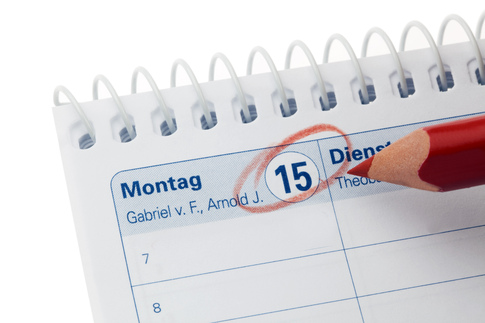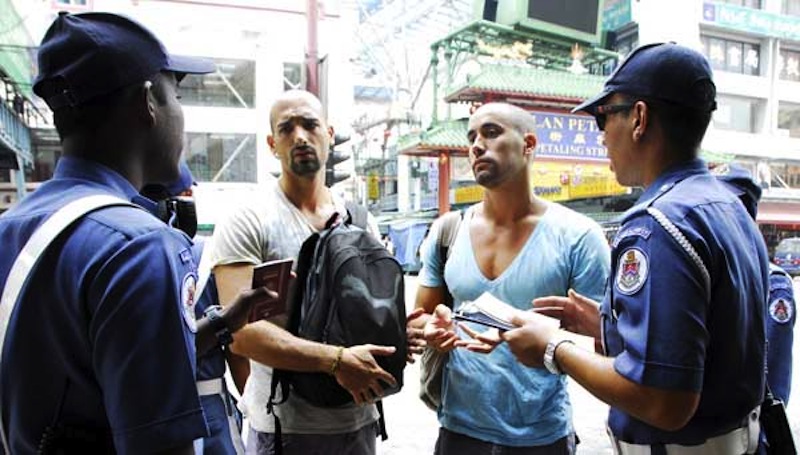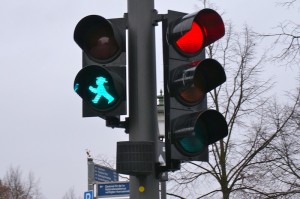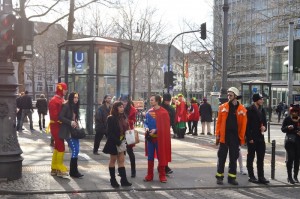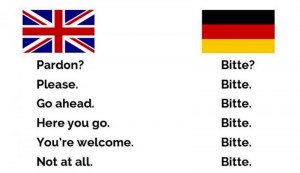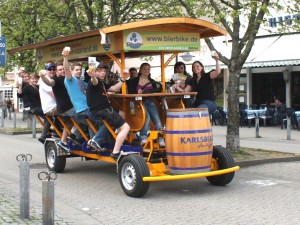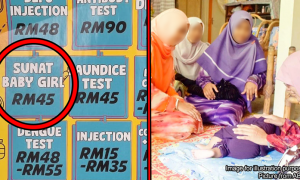8 Malaysian Habits That I’ve (Almost) Lost While Living in Germany
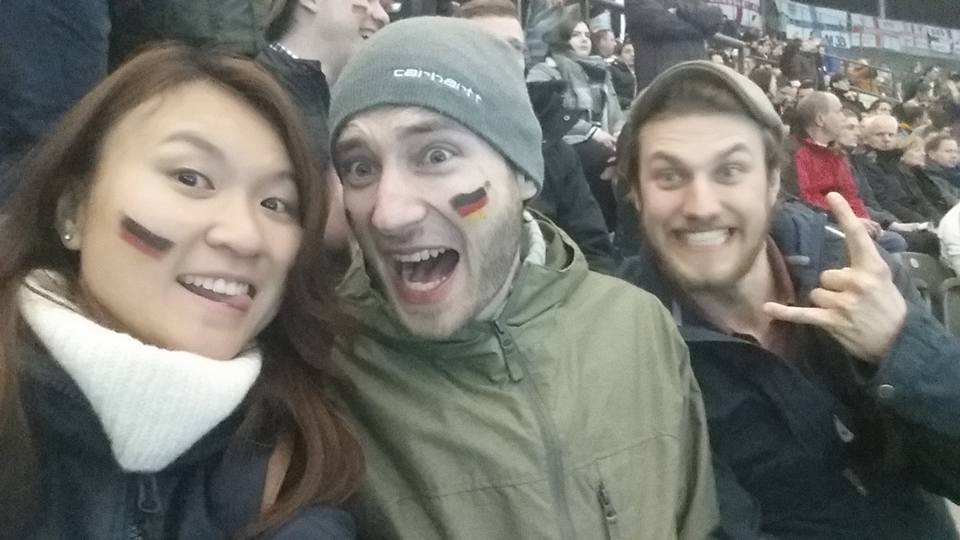
- 2.4KShares
- Facebook2.1K
- Twitter16
- LinkedIn4
- Email81
- WhatsApp124
I’m known as the Tiny Wanderer, because I stand at merely five feet tall short, and for almost a decade, I’d roamed far and wide. I held no permanent address (except for my family home), bank accounts were constantly opened and then closed, and my jobs were fluid and transient. When not working, I’d spend a lot of hours on uncomfortable bus rides. My dad called my wanderlust itchy backside.
“I’ve invested so much in your education and you become a bum? You think money grow on trees issit?” – My dad
Given my extensive wandering experience, I assumed that I’d shed my Malaysian-ness. Heck, I don’t even wake up in the middle night and crave for Nasi Lemak anymore–so that makes me like a super-duper traveller where hyperventilating over different cultural practices are so…lame?
Or so I thought, until I moved to Germany. Because I wanted adventure, I picked my husband’s hometown. His hometown is a kampung where nobody speaks English. Asians here are called ‘Fijis’. And everyday is an adventure because people here sure do things differently.
Here are 8 habits I’ve dropped since living abroad:
1. I don’t put all my sampah into one plastic bag anymore
When I first moved here, it took me a while to decide where to throw my yogurt tub. Is it the yellow, the green or the blue tong sampah? And that’s just the tongs at home! See, Germany recycles up to 70% of their trash, 3rd in the world as a recycling leader after Sweden (90%) and Japan (95%). It’s serious bizness here, ugaiz. The Germans are adamant to save the environment!
In fact, there’s even an incentive. Recyclable bottles and cans (indicated by ‘Pfand’ on their labels) can be deposited at a bottle recycling machine in the supermarket in exchange for cash vouchers. Wine bottles and jars of all sorts on the other hand would hauled off to the other colourful tong sampahs. Then, you have to sort them depending on the glass colour: white, brown or green.
To ensure that everyone living their turf is doing the same too, there’s a chapter in my German as a Foreign Language textbook dedicated to how to throw what where!
In Malaysia, household trash is usually all tied up in a plastic bag and thrown into a black tong sampah. Generally, we only recycle our old newspapers to an old uncle who drives by with a musical honk. But the good news is, Malaysia is now quickly moving into being more eco-friendly. It’ll be a good thing to pick up a tip or two from this Infographic, because come June 2016, there’d be a RM1000 penalty for households who don’t separate their waste properly.
2. I don’t turn up in places without an appointment
If you want to open a bank account, renew your passport, or even see a doctor, you can just easily drive to nearest service branch and get your things done. So easy going! But, it’s not the same here.
Because Germans have their days planned out down to the minutiae that appointments are almost always mandatory.
This appointment-making thing extends all the way to visiting relatives or meeting friends. It’s not cool to spring a surprise visit to someone’s house when they’re not expecting you. Instead of a delighted face, you might get a lecture about how important it is to consider other people’s schedules. Wish I could tell them to relak-lah, bro.
3. I wait for the lights to turn green instead of jaywalking
Jaywalking is illegal and dangerous in Malaysia. Especially on highly congested streets where your failure to estimate the speed of an oncoming vehicle could spell death for you.
Yet despite knowing that, and the best efforts by DBKL for initiating Ops Jejantas where pedestrians get fined up to RM500, people still do it. Especially when cars in Malaysia almost never stop for pedestrians at a zebra-crossing and waiting for pedestrian traffic lights that are kaput. (Fun fact: kaput is originally a German word)
Attending school smack right in the middle of the heart of KL had honed my instincts and taught me how to ‘follow the crowd’ when crossing the road. When the crowd crosses, despite flowing traffic, follow them for better chances of survival.
“Where jaywalking was impossible in Singapore, here it’s a way of life. And it’s done with near-suicidal enthusiasm: I’ve stood paralyzed on the sidewalk, unable to discern an opening, while experienced locals merely waded right into the ooze, as if their thighbones could repel steel.” – ThisModernWorld.com
But in Germany, cars slow down upon approaching a zebra crossing, making it safe for anyone to cross. Main intersections and roads are also equipped with working traffic lights so with a little of patience, you’ll get to cross the road safely without breaking the law.
Interestingly, German law stipulates that it’s only against the law if you cross on a pedestrian red light. (You’ll be fined 5 Euro for doing so and 10 Euro if you cause an accident.) There are however no rules against jaywalking on a street with crossings and lights within an ‘acceptable distance’. Doesn’t seem that harsh, right? So then… why and how are the Germans so famed for road obedience?
During the crazy period of Karneval, Germans would dress up in costumes and start drinking in public from 8am, they would do everything else except jaywalk. I’d witnessed a bunch of Superheroes, wobbly from intoxication, waited for a good two minutes at the lights, despite the seemingly clear road.
Maybe they’re just goody-two-shoes. Or maybe they just don’t enjoy the hateful glares from their fellow citizens whenever someone bends a rule. Either way, I’d learned better not to risk the locals’ wrath and wait for the lights instead.
4. I stopped addressing non-related/related older people “Auntie” and “Uncle”
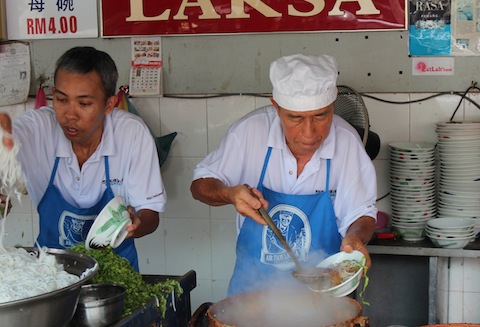
Uncle, give me one bowl of laksa plz!
Or Kak, Bang, Boss, or Jie Jie for that matter. In Malaysia, when you call a friend’s dad “Uncle” or the older lady waiting in the queue “Auntie”, no one will batt an eyelid. Instead, it’s a label of respect for someone older than you. A practice deeply rooted in Asian culture, my husband was confused when asked to address my dad and other family members, “Auntie and Uncle.”
“But it’s weird. It’s like we’re related!” Yes hun, I know. On the flip side, it deeply unsettles me when I in return, have to address his parents, aunties and uncles, by names. Not only does it feels rude to me, I also have to play memory games.
Which then brings me to this realisation: in Malaysia, elderly people especially within our family unit are like Gods. Parents, grandparents and whoever higher in the family hierarchy are respected, honoured and obeyed.
If your mum complains, “Aiyo, my handphone spoil already” that’s a hint for you to get your mum a new mobile phone.
In Germany, parents voice out a need and request for help directly. If the children could help them out, they would. But they won’t feel obligated nor feel bad to decline.
5. Walking or biking instead of driving for a short distance

Eh, we must bike through the forest ah? So many mozzies!!!
“Eh, we go makan nearby, ok?” A friend would ask, and then proceed to grab her car keys. But it’s only a 10-minute walk away. Reasons to drive? Too hot lah, too dangerous, too mafan, too far… (I’m guilty of these excuses too!) that’s why Malaysia was listed as the fattest country in South East Asia.
Driving for short distances certainly do no favours to the already congested roads of big cities like KL, JB, Penang and Malacca! According to World Bank’s data and Nielsen Survey, Malaysia has one of the highest rates of car ownership in the world.
Let’s compare the two capitals- Berlin and Kuala Lumpur .
| Berlin | Kuala Lumpur | |
| Size | 892 square km | 243 square km |
| Population | 3.5 Million | 1.67 Million |
| Cars Registered | 1.2 Million | 3.4 Million |
The country who gave the world beloved car brands like BMW, Mercedes and Volkswagen have lesser rates of car ownership in comparison to Malaysia?
Still I gotta say, I do enjoy being driven.
Ying: How are we getting to the Christmas market?
Husband: Walk lah!
Ying: 45 minutes walk? Siao ah?
Husband: Ok, ok. We bike there.
6. I stopped using Bahasa Rojak (ie: using three languages within a sentence)
“Wah, tapau home so much food ah? The mamak boss stress leh. He for sure ask, why bungkus onli.. apa lah.”
Darn, I’ve missed doing that. Being born and brought up in multicultural Malaysia, this is one skill that I’m the proudest of and now have almost zero chance to use it. Even neighbouring Singapore with four official languages can’t compete.
Malaysians tend to get away with more languages, having to learn both Malay and English in school and then whatever that’s spoken at home, by immediate social circles or just by watching TV. I’d picked up Cantonese from watching TVB soap operas, Mandarin from speaking to my brother who’s a product of SJK (Cina) and a smattering of Hokkien from my grandparents.
In Germany, there are a good variety of German dialects and idiomatic local usage of the language, some more distinct than others , but no one uses Hochdeutsch (standard German) and the local dialect within the same sentence. But at the same time…
7. I start formulating sentences instead of just using “Hah/Ah” in a variety of tones
Malaysians are great at one-syllable language. Something as simple as “Ah” or “Hah” could mean a million things depending on the intonation. “Hah?” could mean, “Si mi? Apa?”, “I beg your pardon?” or “You’ve got to be kidding me, liddat also can?”.
When someone grunts a short “Ah”, that could mean “Yes, I hear you, go on…” or “Yaloh, that’s what I’m talking about”. It’s almost a code language that foreigners will take a while to decipher.
Having grown up with code language, I often find myself doing the same here. I mean, what a handy language isn’t it? Unfortunately, I’ve been told that it’s kurang ajar. So I needed to turn my practical one-syllable “Ah” or “Hah” replies into proper sentences.
In Germany however, the polite people that they are, have their own one word with many meanings too. That’s the one word fit-all Bitte:
8. I drink but don’t drive
In Malaysia, I discovered that having more than two pints of beer never hindered anyone from driving.
Malaysian drivers have a legal limit of 0.8 mg intake of alcohol (in blood) and anything above that could get you fined or jailed, or both. Harsh laws in Malaysia however don’t seem to deter drivers from drinking and driving. Perhaps the lack of proper implementation or infrequency of breathanalyser tests have not scared drivers into obedience. And that’s coming from a country where alcohol is banned in Kelantan and Terengganu and the cost of alcohol is 3 times higher a meal.
In comparison to Germany, alcohol costs the same as water, and the drinking culture makes up a part of the country’s heritage have managed to keep most German drivers sober even if they have to attend a wedding party. Not as restrictive alcohol regulations (ie: it’s not haram here, it’s damn cheap and you can get it everywhere!) have somehow encouraged them to drink responsibly. They know that if they were caught, they could be fined, go through long psychological tests and possibly say goodbye to their driver’s license forever (which costs 1000-2000 Euros to obtain). A new driver, regardless of age, are prohibited from alcohol completely. Also, the intoxicated party is always at fault, should an accident happen. Expats residing here had to learn it the hard way.
Therefore you’ve no idea how many times I’ve heard my husband and his dad going back and forth about who’s driving prior to attending a family event. Whoever drives, doesn’t get to drink.
.
.
.
So following the less of doing things the Malaysian way, and more of doing things the Deutsch way, comes the great question:
… am I more Deutsch than Malaysian now?
Not in a gazillion years lor! You can always take the girl out of Malaysia, but you can never take Malaysia outta the girl. No matter where I go, no matter how long I’ve stayed away, Malaysia is always home in every sense.
The only way I can adapt to my new surroundings, is picking up the best of both cultures and roll with it. Even better is when my husband picks up Bahasa Rojak and now we can laugh over the same homegrown YouTube gags. Besides, straddling two different cultures in a household always spices things up.
And I lied in the beginning. I still wake up at night craving Nasi Lemak. That’s why we drove all the way to Berlin (2 hours away) just to get belacan and ikan bilis, and served the German lot the most pedas sambal ever. Speaking of which…
Errr hun, can we balik kampung now?
- 2.4KShares
- Facebook2.1K
- Twitter16
- LinkedIn4
- Email81
- WhatsApp124



